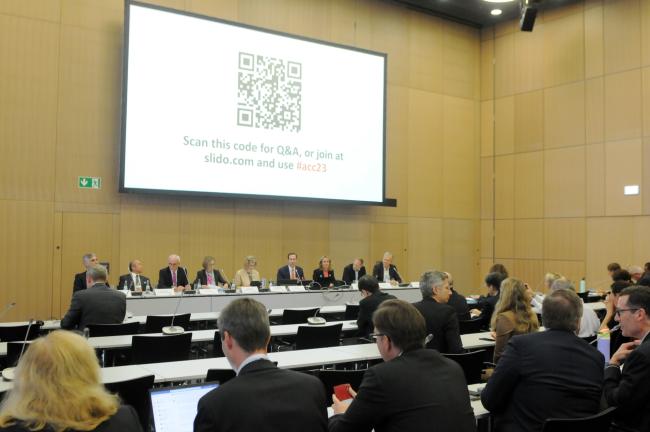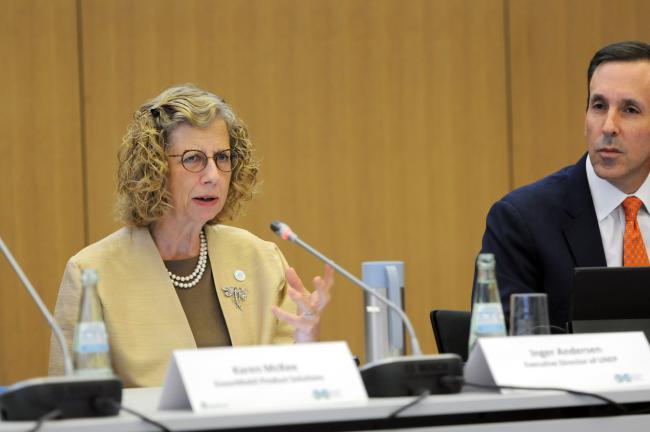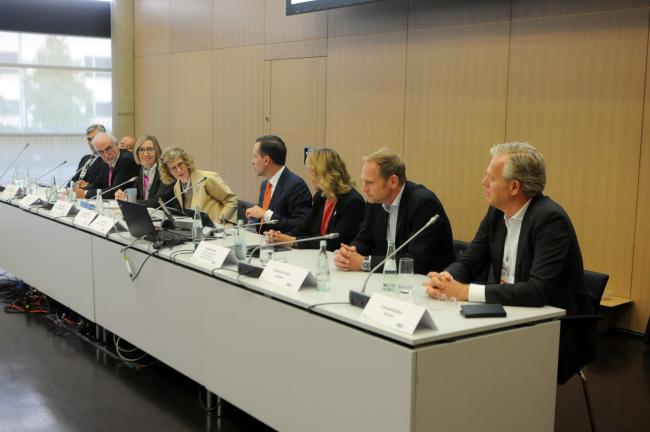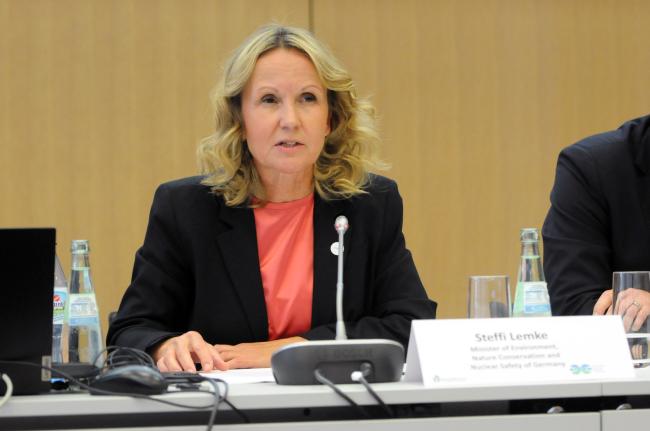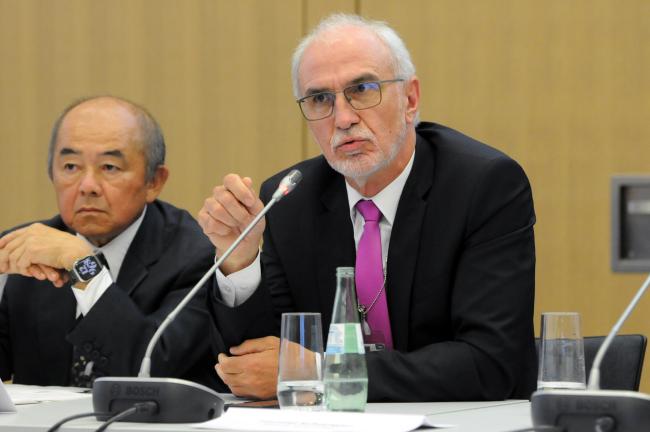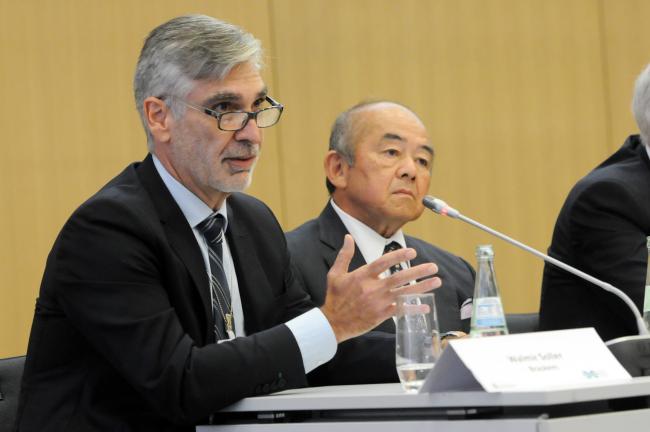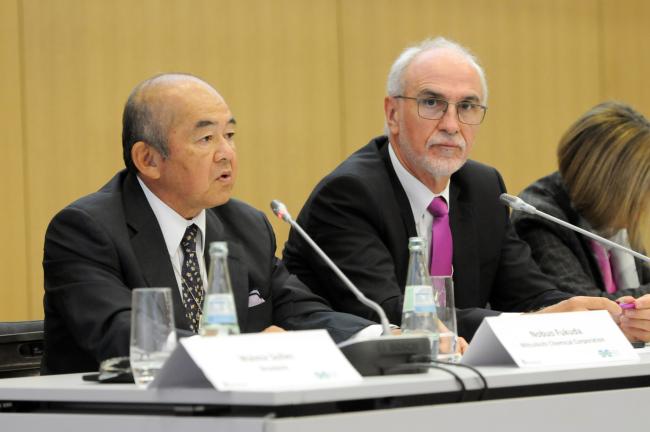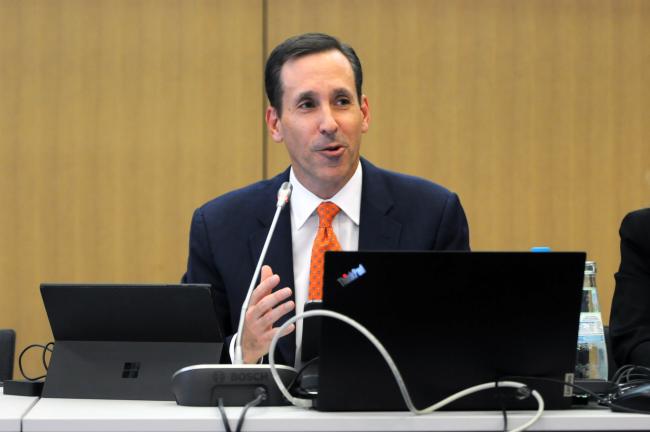About
During this event, chemicals industry representatives shared their perspectives on chemicals management as well as their ambitions for 2030; however, with global production capacity set to increase, there is pressure on the industry to rise to higher standards.
Chris Jahn, CEO, American Chemical Council (ACC), moderated this side event for the International Council of Chemical Associations (ICCA). The event focused on the chemical industry’s perspectives on chemicals management. Noting that the ICCA covers 90% of global chemicals sales, he announced the Council’s new ambitions to:
- by 2030, make all available data accessible concerning the safety and sustainability of their products;
- by 2030, assist 30 countries in implementing effective chemicals management systems, via building a capacity-building hub and helping match actors needing and actors providing support; and
- by 2030, steer product portfolios and their processes towards sustainable solutions under the Sustainable Development Goals (SDGs) and regularly report on progress.
Inger Andersen, Executive Director, UN Environment Programme (UNEP), commended industry on its ambition, but said the world is not doing enough to ensure a safe, healthy, and sustainable future so industry must make critical inputs and “will be held to a very high standard.” She said even if impacts cannot yet be seen they will be eventually, and called on industry to ultimately become a USD 10 trillion industry with no negative impacts. She noted ICCA members have the financial power to: make inroads; innovate to replace some current harmful chemicals, including plastics; show accountability; and contribute to financing. She commented that the earliest companies leading on green and sustainable chemicals will capture market share alongside saving lives.
Steffi Lemke, Minister of Environment, Nature Conservation and Nuclear Safety (BMUV), Germany, noted the production capacity of the global chemical industry doubled between 2000-2017 and will double again by 2030 with rising global population and living standards. She said this creates pressure to act to curb negative health and economic impacts. She urged participants to arrive at consensus on the Beyond 2020 framework on Friday. She said industry’s power brings great responsibility and called for all to work together “on equal footing,” including users along the supply chain and the finance sector. She called for financial support in several areas, namely:
- creating specific projects and partnerships and adding to existing partnerships;
- innovating so chemicals are part of the solution; and
- making all chemicals “sustainable by design.”
Karen McKee, ExxonMobil Product Solutions, reported that ICCA’s Responsible Care capacity-building support in many countries on managing risks and hazards led to its new proposal for a tangible in-depth capacity-building platform with not only the matchmaking function but also the ability to enable efficient and effective capacity building in small developing states.
Conrad Keijzer, Clariant, described the ICCA’s transparency ambition as starting with the need for public, transparent data on product safety, which his company is responsible for. He lamented that more than 100 countries have no registration system or legislation for chemicals, citing ambition on global safety and best practices on handling products. On sustainability, he said the industry needs data on greenhouse gas emissions figures for manufacturers to display on their products.
Harald Schwäger, Evonik Industries, noted the largest carbon footprint from shampooing is from heating water. He questioned whether a decline in the global population is better than striving for food preservation processes using continually improving chemicals production. He agreed chemical products should do more good than harm or no harm at all. He said industry standards are the same around the globe and that improving innovation can replace some harmful chemicals, although it is a moving target.
Walmir Soller, Braskem, said his company was born in 2001, so sustainability “is part of our DNA.” He cited many steps in Braskem’s innovation and technology toward sustainability. He noted the need for policies and regulation to accelerate the low-carbon transition, but stressed that “we cannot wait for the perfect conditions to move ahead.” He mentioned such initiatives as: a USD 300 million investment in producing a negative-carbon footprint plastic that would remove CO2 from the environment; a sustainability index to prioritize investments, including for the end of product life; and other market development efforts, noting public policies will accelerate the process.
Thorsten Dreier, Covestro, said his company provides raw materials, including rigid, flexible, and soft foams. He noted room to improve their properties and energy efficiency, but said output is helping to preserve the food chain using as little energy as is possible. He also noted his company’s innovations on: lighter, energy-saving materials for electrification of the automotive industry; prolonging the lifetimes of wind blades and chemicals; and plastics recycling. He said the chemicals industry has many solutions for reducing carbon footprints.
Nobuo Fukuda, Mitsubishi Chemical Corporation, said his company is switching from fossil fuel-based materials to carbon neutrality, which also provides weight reduction. He said it is one of the few industries that can use CO2, with great potential for carbon capture and utilization.
In the ensuing discussion, panelists focused on: how their companies approach green chemistry and the transition away from hazardous chemicals; the role industry can play in helping countries access funding for sustainable chemistry-related initiatives; and ways to ensure that industry will follow through on commitments, given the voluntary character of the framework under negotiation at ICCM5.
Organizer: ICCA
Contact: Chris Jahn I chris_jahn@americanchemistry.com
For more information: www.iccaworld.org/
Text written and edited by Asterios Tsioumanis, Ph.D., Deborah Davenport, Ph.D., and Leila Mead.
All ENB photos are free to use with attribution. For ICCM5 please use: Photo by IISD/ENB | Diego Noguera.
To receive free coverage of global environmental events delivered to your inbox, subscribe to the ENB Update newsletter.

